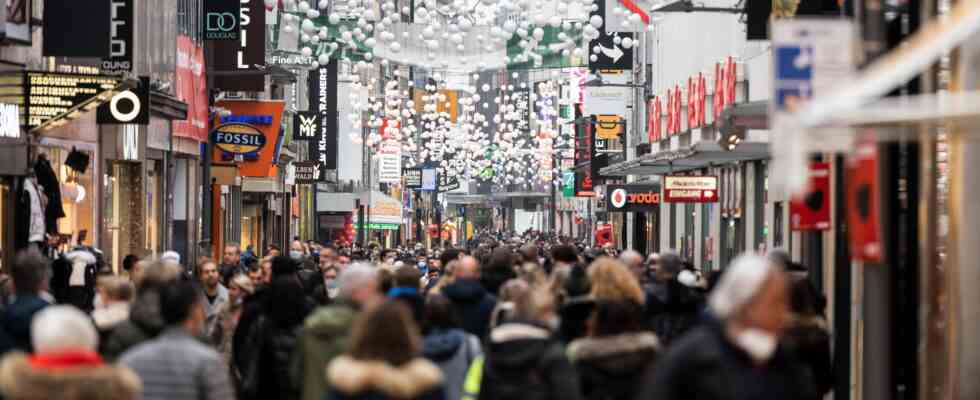Status: 10.11.2022 2:04 p.m
Retailers are having to cope with losses, some of which are significant, due to the corona crisis, high inflation and delivery bottlenecks. Many also expect weak Christmas business – just like the parcel industry.
After sales had already plummeted from January to September, the majority of German retailers are also pessimistic about the Christmas business in view of their customers’ loss of purchasing power due to high inflation. 70 percent expect things to be worse than last year, according to a survey of 500 companies by the German Retail Association (HDE) published today.
Christmas bonus and surveys give hope
Despite the difficult environment, the industry association expects sales to increase by 5.4 percent to EUR 120.3 billion for the last two months of the year. Adjusted for price, however, this is a minus of four percent compared to the same period last year. “Sales only grow through inflation-related rising prices,” explained HDE Managing Director Stefan Genth this difference. “It remains a difficult time for trading companies.”
However, the industry is giving hope for the end-of-year sprint because many consumers do not want to skimp on spending, despite inflation and the risk of recession. Almost one in five of the 2,000 people surveyed stated that they spent more than 300 euros on Christmas presents. Compared to the previous year, more than 40 percent want to keep their spending on gifts at the end of the year stable, while 18 percent want to spend “significantly” less. Gift vouchers, toys, books and cosmetics are likely to be the big hits in the Christmas business this time, as the survey shows.
“The high inflation and the bad mood among consumers aren’t actually good omens for the Christmas business,” said Genth. “Despite everything, customers are determined to invest in gifts.” One reason could be the Christmas bonus, which beckons more than every second employee. 54 percent get this special payment, as determined today by the Economic and Social Science Institute (WSI) of the Hans Böckler Foundation, which is close to the trade union. The Christmas bonus is more important than ever, said Thorsten Schulten, head of the WSI collective bargaining archive.
Retail sales collapsed
Meanwhile, the retailers in the shopping streets of the German inner cities have had to accept high losses this year. Because of the corona pandemic, record inflation and competition from online trading, sales dropped significantly from January to September. According to the Federal Statistical Office, sales in clothing stores fell by 11.0 percent compared to the same period in the pre-Corona year 2019, adjusted for price increases (in real terms).
A similar development can also be seen in other shops typically found in inner cities. Price-adjusted sales of books in brick-and-mortar retail even fell by 21.0 percent in the first nine months compared to the pre-crisis period, while toy stores posted a decline of 17.5 percent.
The declines in consumer electronics retail (minus 7.4 percent) and shoes (minus 4.9 percent) were smaller. In contrast, retail sales of jewelry and watches increased by 17.8 percent in real terms. All in all, stationary retail, which also includes pharmacies and petrol stations, achieved a price-adjusted increase of only 3.0 percent.
Online trade, which has been booming for a long time, is also weakening
According to the Wiesbaden authority, a change in buying behavior and rising operating costs could be the reason why there are falling sales in the inner cities and fewer and fewer shops in Germany. Within ten years, their number fell by 10.2 percent to almost 385,600 nationwide in 2020.
Online and mail-order business is a major competitor for bricks-and-mortar retail. However, this is also feeling the effects of the near record low level of consumer spending as a result of high inflation. After two extraordinarily strong Corona years, in which many consumers avoided the shops because of the increased risk of infection and preferred to shop by mouse click or smartphone, the HDE expects a decline in online sales of 2.3 percent for the full year this time. Adjusted for inflation, they are even expected to fall by 7.2 percent.
This also has consequences for the parcel industry in Germany, which expects significantly fewer orders than usual in this year’s Christmas business. In November and December, around 415 (2019: 355) million shipments will reach consumers, after around 445 million in the previous year, according to the Bundesverband Paket und Expresslogistik (BIEK) based on a market analysis by KE-CONSULT Kurte&Esser GbR. That is around seven percent less than in the same period last year. This means that the courier, express and parcel (CEP) market is still well above the pre-Corona level.

